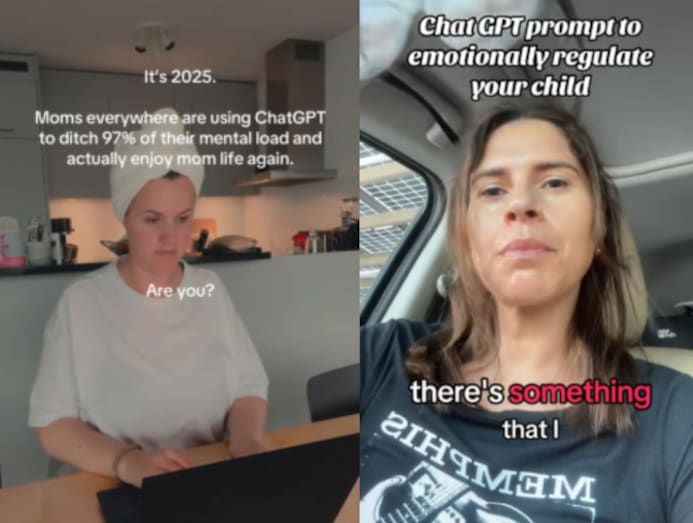Are you relying on ChatGPT for parenting advice? Here's why AI can’t replace the village a mother needs
ChatGPT may offer mums endless hacks and reassurance, but being a mum takes experience, even if it means making mistakes. CNA Women’s Izza Haziqah says ChatGPT can never replace a good support village and human advice.

ChatGPT doesn’t always give the best advice, and the writer cautions mothers against turning to it to solve every parenting problem. (Photo: iStock/Hispanolistic)

This audio is generated by an AI tool.
When a close friend returned to work after maternity leave, I texted her to see how she was doing. How was she coping with juggling full-time work and caring for her firstborn?
She appeared chirpy and excited, but having gone through the newborn haze and (ongoing) struggles of returning to work myself only a year ago, my alarm bells went off.
At my insistence, she confessed: “Well… So I’ve been back to work for a week, and I thought I could manage caring for my baby and working from home, but it turned out to be so freaking hard. And now I feel like a total failure.”
Baffled, I asked her: “Who told you you could work and care for a baby at the same time? Caring for a baby is a whole other job.”
Sheepishly, she replied: “I asked ChatGPT…”
“Chat told me I just need to do this, this, and that, and I’m all set,” she said.
I rang her and for 30 minutes, she told me about all the things she relied on ChatGPT for when it came to dealing with new motherhood: Talking about her feelings, ranting about her parents and in-laws, getting tips for putting her baby to bed (which, she admitted, weren’t all that helpful), and now, advice on how to manage work and a baby.
CHATGPT LEAVES NO SPACE TO HONE YOUR MUM INSTINCT
My friend is not alone. Search “ChatGPT motherhood tips”, and you’ll find countless Instagram reels, TikTok videos, mum blogs, and forums, all praising how ChatGPT has been instrumental in helping mothers lighten their mental load.
And I get it.
Being a mum is overwhelming. There’s caring for the children, managing the house, and juggling other responsibilities. Even with a supportive, present partner, it can still feel like too much.
Hence, enter ChatGPT. The seemingly perfect companion who gives instant answers to all your questions.
It can become your counsellor, friend, or even a pseudo-psychologist. Despite the apparent risks – legal concerns and even cases of “AI psychosis”, where users experience worsening paranoia or delusions – the appeal of ChatGPT is undeniable.

Curious about the benefits of formula versus breast milk? ChatGPT will summarise both sides in seconds.
Wondering what each cry or wail might mean? It can produce a whole table of possible reasons.
Planning a trip to Japan with your family of five? You can have a packing list and a rough 10-day itinerary before your toddler finishes her snack.
No idea what to cook for your picky kids tonight? Enter your personal AI sous chef with meal suggestions and calorie counts.
Even I, far from being the biggest fan of AI, can’t deny how helpful ChatGPT is for menial tasks and easing my mental load.
The thing is, where do we draw the line?
When we rely on ChatGPT for every small decision, we build a habit of outsourcing. That habit can creep into the big, tender spaces where we actually need to rely on ourselves as parents.
It’s one thing to let ChatGPT take care of grocery lists and dinner ideas. It’s another when we start turning to AI for major parenting decisions – whether to leave work and become a stay-at-home mum, figuring out co-parenting strategies as a single parent, or even just managing your child’s fever.
These aren’t simple questions with neat answers. They are deeply emotional moments that shape parenthood.
When we rely on ChatGPT for every small decision, we build a habit of outsourcing.
Worse, ChatGPT has a knack for validating almost everything we say. It is the perfect enabler.
On the surface, it’s comforting – especially for tired, overstretched mothers who just need someone to tell them they’re doing okay. But it creates the dangerous illusion that we’re always right.
In parenting, that can get really risky.
Being a parent isn’t about always getting it right. It’s also about the growth we experience from making mistakes.
Those missteps, awkward experiments, and imperfect moments (especially the ones that make us feel like failures) are invaluable. We learn from them, and they sharpen our instincts and build our resilience as mothers.
If we outsource too much and surround ourselves with constant affirmation (from both ChatGPT and humans), we miss out on that growth. We risk raising our children on advice polished by algorithms that have no idea who we are or what our lives are like.
MUMS NEED A HUMAN COMMUNITY
Turning to ChatGPT for everything parenting-related means we’re losing out on having an actual village.
Parenting isn’t meant to be done solo. It’s why the constant 24/7 availability of ChatGPT is so alluring. We put in any problem, and it solves it for us.
When my baby had a fever, I asked ChatGPT, which laid out information cleanly.

But when I asked the same question in my mums WhatsApp group chat, I got something different.
There, I heard from mothers who had experience – and mistakes – under their belt. They asked me questions I hadn’t thought of, like whether my feverish son was active or lethargic, and what happened the last time he had a fever.
More importantly, some mums simply held space for me as I stressed over my son’s fever. One even asked for my address to send a care pack consisting of medication and some treats for my son. And in the days that followed, others checked in to ask how he was doing.
I may not have all the answers or make the best decisions. But knowing I have an actual community – from online friends to mums I meet once a month, and my own family – makes me feel more assured, less alone, and less afraid of the issues that come with parenthood.
ChatGPT can give practical answers – how to encourage my son to fall asleep on his own, how to get him to eat vegetables, tips to make him stop drawing on walls (spoiler alert: none of them worked). It can even offer comfort when I feel like I’m failing.
But at the end of the day, AI is still a tool. It doesn’t and can never understand all the different, messy parts of who I am.
No chatbot can hold me when the baby is finally asleep, hear the crack in my voice when I face different dilemmas, or sit with my silence as I reflect on the past year as a new mother.
So, with my friend who asked ChatGPT if it was possible to work from home while caring for her baby, I suspect she was probably looking for reassurance.
She didn’t need an AI-generated list of steps. What she needed was people to listen to her (and set her straight where necessary). She needed a supportive village of friends, neighbours and community to show up for her, so she wouldn’t feel like she had no choice but to depend on a chatbot for her parenthood journey.
That village is slow, inconvenient, even contradictory, at times aggravating, sometimes scolding (cue parents and in-laws). It’s totally imperfect – but it’s present.
If we can nurture this village, then we don’t need to worry about being overly reliant on ChatGPT. Instead, we can use it for what it should be used for: Coming up with the best meal recipes we’ll never follow.
CNA Women is a section on CNA Lifestyle that seeks to inform, empower and inspire the modern woman. If you have women-related news, issues and ideas to share with us, email CNAWomen [at] mediacorp.com.sg (CNAWomen[at]mediacorp[dot]com[dot]sg).






